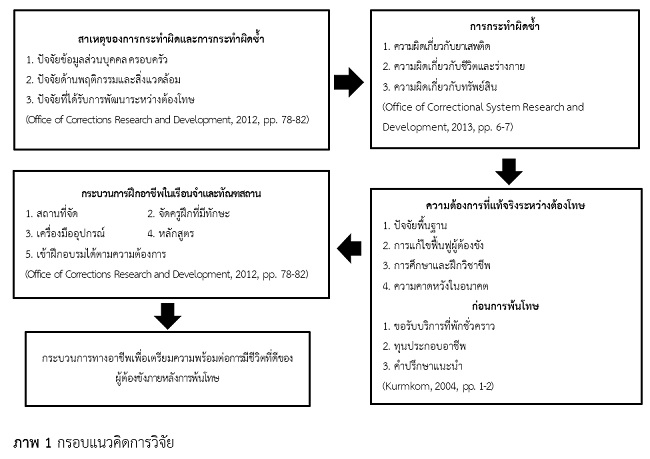VOCATIONAL PROCESS FOR A BETTER LIFE PREPARATION OF PRISONERS AFTER IMPRISONMENT
DOI:
https://doi.org/10.14456/nrru-rdi.2022.34Keywords:
Newly-released prisoners, Treatment to prisoners, Career process, Meaningful career processAbstract
This research aimed to investigate 1) the situations and causes of offense and recidivism; 2) process of rehabilitation in vocational training in prison; 3) needs for vocational training and good life after imprisonment; 4) meaningful vocational process to prevent recidivism of the prisoners. The key informants included administrators, personnel staff, inmates, social workers, vocational training supervisors in correctional sites of 4 places, totaling 156 people. The instrument was a semi-structured interview with the validation accuracy of 0.50-1.00. Data were collected of field research and analyzed with content analysis. The findings revealed that the prisoners experienced a recidivism of drug trafficking and abuse most followed by fraud killing and robbery cases. In terms of recidivism, they did not admit what happened, and their mental state was vulnerable after imprisonment. They were often returned to their original environment resulting in repeated offenses. The offense and recidivism were from self-internal and external and environmental causes. In fact, prisons had provided the vocational training, life planning, identifying, and adjusting the inmates’ attitudes towards the occupation as well as training and assessing their performance applicable for a future career preparation. However, most of informants had a need for work, and earning their incomes. In addition, the vocational process is meaningful for their hope and relieve the stress in starting a career and generating income after the imprisonment, also builds the character of self-reliant and self-esteem.
References
Deduang, P. (2007). Factors affecting the offense of drug distribution cases among female prisoners: a case study of the Central Women Correctional Institution. Thesis, Master of Arts Program in Justice Administration Branch, Thammasat University, Bangkok. (In Thai)
Department of Probation. (2017). 20-Year Strategic Plan (2017-2036). Retrieved May 9, 2017, from http://164.115.41.115/u5/probation/index.php (In Thai)
Doddamkeng, S. (2014). Benefits of inmates with a classification system. Thesis, Master of Laws Program in Department of Law, Dhurakij Pundit University, Bangkok. (In Thai)
Jesadarak, S., Suwanhong, R., Yantana, N., Ruamchit, M., Sakrangkun, P., & Bunmakan, W. (2010). Adjustment of prisoners after their release from prison. Research Report. Office of Social Work Department of Corrections, Bangkok. (In Thai)
Kijphitak, P. (2009). Adaptation of new female inmates at the Thonburi Women Correctional Institution. Thesis, Master of Arts Program in Justice Administration Branch, Thammasat University, Bangkok. (In Thai)
Kurmkom, N. (2004). study of Needs of females inmates : a case study of Nakhornpathom Central Prison. Thesis, Master of Arts Program in Department of Justice Administration, Thammasat University, Bangkok. (In Thai)
Ministry of Justice. (2019). Project to return good people to society. Retrieved May 14, 2017, from https://www.moj.go.th/thainiyom/detail?id=8 (In Thai)
Office of Correctional System Research and Development. (2013). Factors Related to Recidivism. Research Report. Rehabilitative Development Section Office of Research and Correctional System Development, Nonthaburi. (In Thai)
Office of Corrections Research and Development. (2012). Pattern development and behavioral development process Occupational training for prisoners of the Department of Corrections. Research Report. Rehabilitative Development Section Office of Research and Correctional System Development, Bangkok. (In Thai)
Office of the Education Council. (2008). Vocational Education Act B.E. 2551. Retrieved April 28, 2017, from https://www.onec.go.th (In Thai)
Phothisita, C. (2009). The science and art of qualitative research (4th ed). Bangkok : Amarin Printing and Publishing Public. (In Thai)
Rovinelli, R. J., & Hambleton, R. K. (1977). On the use of content specialists in the assessment of criterion-referenced test item validity. Dutch Journal of Educational Research, 2, 49-60.
Super, D. E. (1957). Career pattern as a basic for vocational. New York : Harper and Brother.
Tangkittipaporn, J. (2013). General psychology (1st ed.). Bangkok : Chulalongkorn University. (In Thai)
UNESCO. (1978). Indicators of Environmental Quality and Quality of Life. Paris : UNESCO.
Woraphat, T. (2013). The Crisis of Human Rights in Prison: Prison Overdose Phenomenon. Personal Academic Document. Office of the Constitutional Court Constitution College, Bangkok. (In Thai)
(2019, 5 February). Prisoner. Interview. (In Thai)
(2019, 5 February). Prisoner. Interview. (In Thai)
(2019, 5 February). Prisoner. Interview. (In Thai)
(2019, 6 February). Prisoner. Interview. (In Thai)
(2019, 6 February). Prisoner. Interview. (In Thai)
(2019, 7 February). Prisoner. Interview. (In Thai)
(2019, 7 February). Prisoner. Interview. (In Thai)
(2019, 7 February). Prisoner. Interview. (In Thai)
(2019, 11 February). Prisoner. Interview. (In Thai)
(2019, 11 February). Prisoner. Interview. (In Thai)
(2019, 11 February). Prisoner. Interview. (In Thai)
(2019, 12 February). Prisoner. Interview. (In Thai)
(2019, 12 February). Prisoner. Interview. (In Thai)
(2019, 13 February). Manager. Interview. (In Thai)
(2019, 13 February). Personnel responsible for caring for Prisoner. Interview. (In Thai)
(2019, 13 February). Prisoner. Interview. (In Thai)
(2019, 13 February). Officer of control for training vocational. Interview. (In Thai)
(2019, 5 March). Prisoner. Interview. (In Thai)
(2019, 5 March). Prisoner. Interview. (In Thai)
(2019, 13 March). Social Worker. Interview. (In Thai)

Downloads
Published
How to Cite
Issue
Section
License

This work is licensed under a Creative Commons Attribution-NonCommercial-NoDerivatives 4.0 International License.




